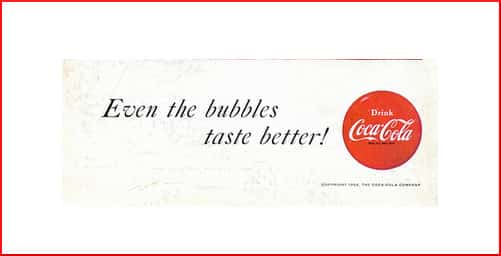
Anybody can search through online message boards and forums, and find something like a comment from a woman whose boyfriend switched from regular soda pop to the diet version and lost 20 pounds in a month. But is this a good idea? Yesterday, Childhood Obesity News mentioned a study from the University of Naples whose conclusion was that the presence of fizz in a soft drink somehow deceives the human brain. The picture on this page shows a slogan from a 1956 Coca-Cola advertisement — “Even the bubbles taste better!”
ScienceDaily.com went into more detail about how this works. For one thing, carbonation causes the brain to be confused about whether the sweetener in a drink is real or artificial, which to the consumer is a selling point. But it also somehow prevents the brain from recognizing how much sweetener, whether real or artificial, is really being assimilated by the body. So the advantage is only momentary and illusory, because despite the lower calorie count in diet drinks, people who habitually consume them still tend to be obese, with metabolic diseases and eating disorders.
The University of Iowa Hospitals and Clinic kept track of 60,000 middle-aged women over a 10-year period, having them fill out questionnaires about what they ate and drank. The study took a particular interest in diet soft drinks and diet fruit drinks. Here’s what came out:
Researchers found women who drank two or more diet drinks a day were 30 percent more likely to have a heart attack or other cardiovascular “event,” and 50 percent more likely to die, than women who rarely touch such drinks.
Beverage Digest reported that between 2005 and 2012, the volume of carbonated beverages sales fell every year. The suspicion within the industry is that negative publicity about artificial sweeteners is responsible for the reduction. The thinkers whose job it is to keep sales robust came up with two possible cures for the anemic sales. One solution would be to use non-chemical sweeteners, which takes weight-conscious customers right back to square one.
The other possibility would be to “change consumer perception about the health risks” of artificial sweeteners. In ordinary language, that translates to ramping up the propaganda and brainwashing. Great, just what the world needs — more baloney disguised as advertising.
Instead
This narrative fragment comes from a Reddit contributor known as “bluesonicscrewdriver,” who attributes six rotten molars to a Coke habit. It suggests a plan for getting un-addicted from soft drinks, by someone who actually did it. This person first tried substituting plain water, with no satisfaction. Then she or he started experimenting with the many varieties of loose-leaf tea. (It needs to be brewed that way because tea bags just don’t have the same flavor.) Here’s the endorsement:
Tea brings me joy and peace to drink, and the “every flavor ever” aspect to it made me so obsessed with collecting and trying every kind I could that I just gradually had less and less room in my life for pop. And I stopped drinking it.
The switch from pop to tea made a relatively large change to my body. Sick WAY less often … fewer muscle cramps and weird pains I’d always taken for granted, more energy, MUCH better skin.
Over time, my appreciation for it has seemed to refine my palate somewhat. I prefer less and less sugar in things. I find it easier to eat vegetables. I’m pickier about food in a different way – too much salt, sugar or grease disgusts me.
Also, Childhood Obesity News doesn’t usually get into recipes, but these eight fruit smoothie combinations, collected by Rachel Aydt, sound particularly appealing. Plus, some of them whip up into truly startling colors, which is always a plus for kids. The more radioactive it looks, the better they like it.
Your responses and feedback are welcome!
Source: “I’m a pe teacher who needs advice about a morbidly obese student,” Reddit.com, January 2014
Source: “Carbonation alters the mind’s perception of sweetness,” ScienceDaily.com, 09/17/13
Source: “Diet drinks linked with heart disease, death,” CNBC.com, 03/29/14
Source: “Diet Coke may take the pop out of Coca-Cola shares,” CNBC.com, 03/27/14
Source: “Hello! HamPlanet Boogie 2988…,” Reddit.com, October 2013
Source: “8 Boredom-Busting Smoothie Recipes,” MensFitness.com
Image by SenseiAlan

 FAQs and Media Requests:
FAQs and Media Requests: 











